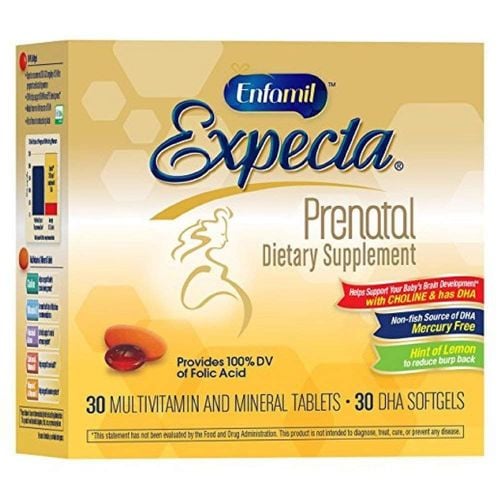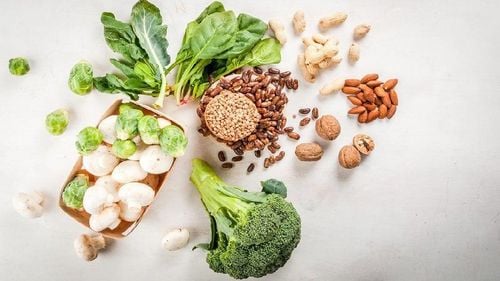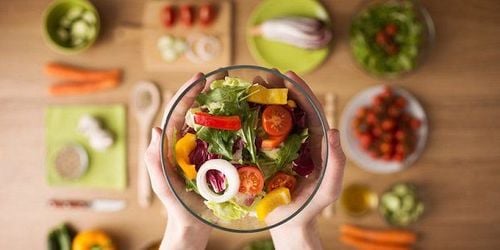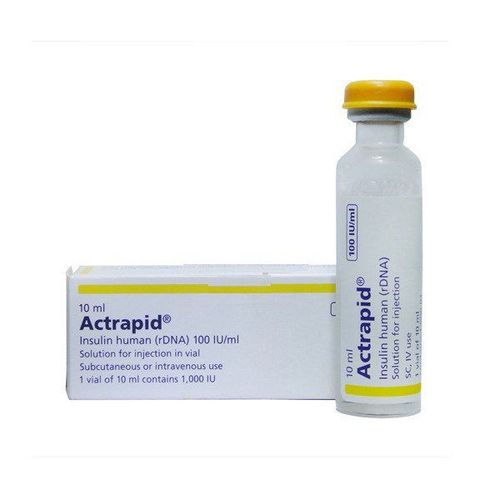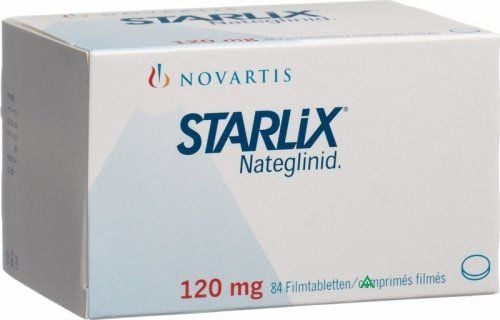This is an automatically translated article.
Type 2 diabetes when not well controlled can increase the risk of complications such as stroke, heart disease and nerve damage. To ensure effective management of blood sugar and body weight, people with type 2 diabetes should strive to follow a balanced diet with a variety of nutrient-dense foods.
1. What to eat when you have type 2 diabetes?
If you are living with type 2 diabetes, following a suitable and balanced diet can help you effectively control your blood sugar and weight. So what should you eat when you have type 2 diabetes?
For type 2 diabetes, you need to make sure to choose and follow a diet with a variety of foods rich in nutritional value, helping to provide adequate fiber, vitamins and minerals that the body needs. needed. In addition, people with type 2 diabetes should also add more foods rich in heart-healthy fats to their daily diet, including monounsaturated and polyunsaturated fatty acids. . These substances can help significantly lower blood cholesterol levels, thereby contributing to supporting and improving cardiovascular health.
In addition, the diet of people with type 2 diabetes also needs to be sustainable and easy to follow. Diet plans that are too strict or don't fit your lifestyle can be harder to follow in the long run.
Here are some examples of nutritious foods that people with type 2 diabetes should choose to consume regularly in their diet, including:
Fruits, such as strawberries, apples, oranges, peaches, pears or melons Vegetables, such as cauliflower, broccoli, cucumbers, spinach, or zucchini Whole grains, such as quinoa, oats, farro or brown rice Legumes such as chickpeas or lentils Nuts such as walnuts, almonds, macadamia nuts, pistachios, cashews, chia seeds, hemp seeds, flaxseeds or pumpkin seeds Protein rich foods such as seafood, poultry Remove the skin, tofu, lean red meat and tempeh. Heart-healthy fats like canola, olive, avocado or sesame oils Certain beverages like water, unsweetened tea, black coffee or vegetable juices
2. What to avoid when you have type 2 diabetes?
What should you avoid when you have type 2 diabetes? In fact, there are not so many foods that people with type 2 diabetes need to avoid completely. Nutritionists recommend that people with high blood sugar levels choose foods rich in vitamins and minerals, and low in fat, cholesterol and sugar.
On the other hand, people with type 2 diabetes need to avoid consuming foods high in trans fats, saturated fats and added sugars to help support better blood sugar management as well as prevent diabetes. Health complications are associated with diabetes.
Here are some foods that need to be restricted for type 2 diabetes, including:
High-fat meats such as beef, pork, lamb, dark chicken, skin poultry Sweets such as cookies, candy, ice cream, pies or desserts Whole milk, cheese, butter and yogurt . Sugary drinks like soda, juice, sports drinks and sweetened teas Sweeteners like brown sugar, table sugar, maple syrup, honey and molasses Processed foods like popcorn, chips, fast food, and processed meats Trans fat foods such as fried foods or partially hydrogenated oils

Người mắc bệnh tiểu đường type 2 nên hạn chế tiêu thụ thịt chứa nhiều chất béo
3. Counting carbs for type 2 diabetes
Carbohydrate counting is considered one of the ways to help people with type 2 diabetes effectively control their blood sugar. You can do a simple carbs count by adding together the number of grams of carbohydrates you consume at each meal.
With careful monitoring, you can know how many grams of carbs you need to consume to maintain a safe blood sugar level while injecting insulin. If you find it difficult to start counting carbs, you can consult a nutritionist or doctor.
Here are some foods that are high in carbohydrates, including:
Rice, wheat, cereals and whole grain foods Potatoes and some other starchy vegetables Lentils , dried beans and other legumes Milk or yogurt Fruit or fruit juice Processed snacks, sugary drinks and desserts People with type 2 diabetes can find out the carbohydrate content of common foods through online resources or books. For processed or packaged foods, you can get an idea of the carbs by checking their nutrition labels.
4. Is the Keto diet beneficial for people with type 2 diabetes?
The Keto diet typically involves eating low-carb foods and focusing on foods high in fat and protein, such as seafood, poultry, meat, cheese, eggs, nuts, and seeds. other seeds. In addition, this diet also includes non-starchy vegetables such as cauliflower, broccoli, kale, cabbage and some other green vegetables.
People with type 2 diabetes can follow the Keto diet, as it can help effectively manage blood sugar levels as well as improve levels of good cholesterol HDL and triglycerides. This diet typically limits carbohydrate-rich foods, such as grains, sweets, dried legumes, fruits, and vegetables. Typically, the Keto diet consists of only 20-50 grams of carbs per day.
Many studies also show that the Keto diet for type 2 diabetics not only improves blood sugar levels but also helps reduce insulin resistance. However, depending on the high-protein foods you choose, the Keto diet, like many other low-carb diets, can be high in saturated fat. To remedy this, you should cut back on your saturated fat intake by limiting your intake of fatty pork, red meat, and cheese. In addition, the Keto diet can make it difficult for people with type 2 diabetes to get the full amount of fiber they need. So you need to eat more foods that are low in carbs but high in fiber, such as green vegetables and nuts.

Chế độ ăn Keto có thể áp dụng cho người bệnh tiểu đường type 2
5. Is the Mediterranean diet good for people with type 2 diabetes?
The Mediterranean diet is an eating pattern that emphasizes the high consumption of plant-based foods, including vegetables, fruits, whole grains, nuts, dried beans and olive oil. . In addition, it also recommends limiting consumption of red meat and small portions of fish, eggs, poultry and dairy products.
The Mediterranean diet aims to provide dieters with adequate vitamins, fiber, minerals and other healthy fats. What's more, it's also low in saturated fat, cholesterol, added sugars, and trans fats.
A new study shows that people with type 2 diabetes who follow the Mediterranean diet tend to have more lower blood sugar levels than others. In addition, it also helps patients with type 2 diabetes lose weight, blood pressure as well as cholesterol levels in the blood.
Another review in 2017 found that long-term adherence to the Mediterranean diet can reduce the risk of developing type 2 diabetes by 20 to 30% and the risk by 28 to 30%. have heart diseases.
6. Is the DASH diet good for people with type 2 diabetes?
The DASH diet is similar to the Mediterranean diet, primarily geared towards the consumption of plant-based foods such as vegetables, fruits, dried legumes, nuts, seeds and whole grains. whole grain. In addition, the DASH diet also includes low-fat poultry, fish, and dairy products. However, it does recommend that dieters limit their consumption of red meats, sweets, foods high in sodium, saturated fat, and sugar.
According to a new study, the DASH diet could be a not only sustainable but also nutrient rich eating plan for people with type 2 diabetes. Furthermore, it also helps reduce some of the following factors:
Insulin resistance High blood pressure High cholesterol in the blood Body weight The results of a 2019 study in 80 people with type 2 diabetes showed showed that following the DASH diet for 12 weeks significantly reduced triglyceride and cholesterol levels, helping to protect against diabetes-related complications in the long run.

Chế độ ăn kiêng DASH rất tốt với người mắc bệnh tiểu đường type 2
7. People with type 2 diabetes should follow a vegetarian diet?
Vegetarian diets are typically free of red meat, poultry, and seafood, and instead aim to consume plant-based sources of protein, such as beans, tofu, lentils, tempeh beans, and peas. , nuts and seeds. Besides, a vegetarian diet also includes a variety of fruits and vegetables.
For people with type 2 diabetes, following a vegetarian diet can lead to significant reductions in fasting blood sugar and long-term blood sugar management. Furthermore, consuming more plant-based foods and limiting animal products may help reduce the risk of prediabetes, insulin resistance, and type 2 diabetes.
Although following a vegetarian or vegan diet can still meet the nutritional needs of people with type 2 diabetes, not all vegetarian diets are created equal. On the other hand, vegetarian or vegan foods can sometimes not provide all of the healthful nutrients, such as protein, vitamins or minerals. To ensure optimal health, you should eat a variety of foods and strive to provide your body with important nutrients.
Once you know what foods to eat and what not to eat with people with type 2 diabetes, you can follow them to have the safest and safest diet for your health.
Patients with diabetes can go to Vinmec International General Hospital for examination and treatment. There is a team of well-trained, experienced and professional endocrinologists; system of modern equipment, meeting international standards; Professional service quality, high efficiency in diagnosis and treatment.
Please follow the website ( www.vinmec.com ) for more information on health care instructions, which we will update regularly.
Please dial HOTLINE for more information or register for an appointment HERE. Download MyVinmec app to make appointments faster and to manage your bookings easily.
Reference source: .healthline.com




